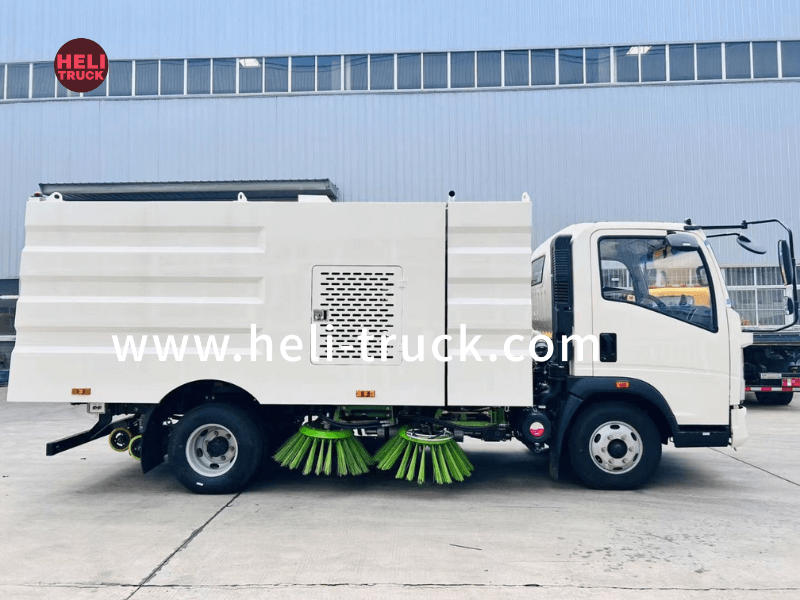Introduction
Garbage compactor trucks play a vital role in waste management systems by collecting and compacting solid waste efficiently. These specialized vehicles are essential for maintaining cleanliness in urban areas and ensuring proper disposal of waste materials. However, like any other heavy-duty machinery, garbage compactor trucks are prone to mechanical issues that can affect their performance and efficiency. In this article, we will explore common problems that garbage compactor trucks may encounter and provide a detailed troubleshooting guide to help operators and maintenance personnel address these issues effectively.
1. Understanding Garbage Compactor Trucks
Before delving into troubleshooting procedures, it is essential to have a basic understanding of how garbage compactor trucks operate. These vehicles are equipped with a hydraulic compactor system that compresses solid waste to maximize the truck's carrying capacity. water tank truck consists of hydraulic cylinders, pumps, valves, and controls that work together to compact the waste efficiently.
Garbage compactor trucks are available in various configurations, including rear-loading, side-loading, and front-loading models. Each type of compactor truck has its unique features and operational characteristics. Understanding the specific design and components of the garbage compactor truck in use is crucial for diagnosing and resolving issues effectively.
2. Common Problems and Troubleshooting Solutions
2.1 Hydraulic System Failures
One of the most common issues with garbage compactor trucks is hydraulic system failures. Hydraulic problems can manifest in various ways, such as slow operation, erratic movements, leaks, or complete system failure. Here are some troubleshooting steps to address hydraulic system issues:
- Check hydraulic fluid levels: Low hydraulic fluid levels can cause the system to operate inefficiently or fail altogether. Ensure that the hydraulic fluid reservoir is adequately filled to the recommended level.
- Inspect for leaks: Hydraulic leaks can lead to a loss of pressure and fluid, resulting in system malfunctions. Check all hydraulic hoses, fittings, and connections for signs of leaks and repair or replace damaged components as needed.
- Test hydraulic pump pressure: Use a pressure gauge to measure the hydraulic pump's pressure output. Low pressure readings may indicate a faulty pump that needs to be repaired or replaced.
- Check hydraulic valves and cylinders: Inspect hydraulic valves and cylinders for signs of wear, damage, or blockages. Clean or replace faulty components to restore proper operation.
2.2 Electrical System Malfunctions
Garbage compactor trucks rely on electrical systems to control various functions, such as the compactor mechanism, lights, alarms, and safety features. Electrical issues can disrupt the truck's operation and pose safety risks. Here are some troubleshooting tips for addressing electrical system problems:
- Check battery voltage: A weak or dead battery can cause electrical system failures. Test the battery voltage using a multimeter and replace it if necessary.
- Inspect wiring and connections: Loose, corroded, or damaged electrical connections can lead to intermittent operation or complete system failure. Inspect all wiring harnesses, connectors, and terminals for signs of damage and secure or replace them as needed.
- Test switches and relays: Malfunctioning switches or relays can prevent the electrical components from functioning correctly. Test these components using a multimeter and replace any faulty parts.
- Check fuses and circuit breakers: Blown fuses or tripped circuit breakers can interrupt the flow of electricity to critical components. Inspect all fuses and circuit breakers and replace any that are damaged.
2.3 Compactor Mechanism Issues
The compactor mechanism is the heart of a garbage compactor truck, responsible for compressing and compacting solid waste efficiently. Problems with the compactor mechanism can result in reduced compaction ratios, jammed materials, or system malfunctions. Here are some troubleshooting steps for addressing compactor mechanism issues:
- Lubricate moving parts: Lack of lubrication can cause friction and wear on the compactor mechanism components. Ensure that all moving parts are adequately lubricated to reduce friction and prolong component life.
- Clear obstructions: Jammed materials or foreign objects in the compactor chamber can impede the compaction process. Clear any obstructions carefully to prevent damage to the compactor mechanism.
- Adjust compaction settings: Incorrect compaction settings can affect the efficiency and performance of the compactor mechanism. Follow the manufacturer's guidelines to adjust the compaction settings for optimal operation.
- Inspect compactor blades and plates: Worn or damaged compactor blades and plates can reduce compaction efficiency. Inspect these components regularly and replace them as needed to maintain proper compaction performance.
3. Preventive Maintenance Practices
In addition to troubleshooting specific issues, implementing preventive maintenance practices is essential for ensuring the long-term reliability and efficiency of garbage compactor trucks. Here are some key preventive maintenance tasks that operators and maintenance personnel should perform regularly:
- Scheduled inspections: Conduct routine inspections of the entire garbage compactor truck, including the hydraulic system, electrical system, compactor mechanism, and chassis components. Check for signs of wear, leaks, or damage and address any issues promptly.
- Fluid checks and changes: Monitor hydraulic fluid levels and quality regularly and top up or replace the fluid as needed. Follow the manufacturer's recommendations for hydraulic fluid type and change intervals.
- Filter replacements: Replace hydraulic filters, air filters, and fuel filters at the recommended intervals to prevent contaminants from entering the system and causing damage.
- Component lubrication: Keep all moving parts of the compactor mechanism properly lubricated to reduce friction and wear. Use the recommended lubricants and follow the manufacturer's guidelines for lubrication intervals.

- Training and education: Provide operators and maintenance personnel with training on proper operation and maintenance procedures for garbage compactor trucks. Knowledgeable and skilled personnel can help prevent issues and address problems effectively when they arise.
4. Conclusion
Garbage compactor trucks are indispensable tools for waste management operations, but they require regular maintenance and troubleshooting to ensure optimal performance. By understanding common problems, implementing preventive maintenance practices, and following the troubleshooting guide outlined in this article, operators and maintenance personnel can keep garbage compactor trucks running smoothly and efficiently. Proper care and attention to these specialized vehicles will contribute to a cleaner and healthier environment for communities around the world.
